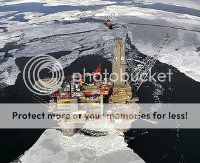Is an Oil Spill in the Arctic a Big Deal?

Shell Oil is still behind on any plan for environmental recovery and cleanup should a spill occur in the Arctic Circle because of their drilling. Their lack of preparedness should not come as a shock as the only theoretical testing the company considered was done back in the year 2000, when Shell proposed the Arctic drilling project. The Republican-majority House and Senate had voted in favor of allowing drilling in the Arctic National Wildlife Refuge (ANWR), but President Clinton vetoed the measure. Clinton's successor Bush express-tracked the proposal to start exploratory drilling within ANWR, which passed muster in the House but was rejected by the Senate. So, what is the big deal about an oil spill in Arctic waters?
The Arctic Region
The Arctic Circle can be looked at as the bottleneck between planetary viability and unsustainability. The Arctic is built up of sea ice, which is different from an iceberg. Sea ice is frozen saltwater made from the ocean while icebergs formulate on land and break off into the water and spread, as is the case with the Antarctic region.
Because Arctic ice masses form strictly from saltwater, it takes consistent colder temperatures to start the process. Ice formation is slowed further because saltwater is considerably denser than freshwater. When the water manages to freeze the newly formed ice is so heavy that it falls away from the mass rather than adhering to it. This means that Arctic ice formations grow from the bottom of the ocean, upwards. Drilling platforms will have to destroy this young ice growth, which adds to the superheating of the area because more of the sun is allowed to penetrate it. In addition, the levels of carbon dioxide (CO2) in the atmosphere have caused the Arctic region to superheat. The primary cause of planetary CO2 is caused by fossil fuel extraction and its use.
Arctic Oil Spill Probabilities
The oil industry receives tax breaks, minimal to no fines for long-term environmental damage, and is not willing to spend the money to make offshore oil drilling safer. Enforced safety protocols would reduce waste, reduce risk, and reduce environmental impact. Yet, oil companies do not do that because it is viewed as cost prohibitive, even though it would reduce the extraction demand, while acquiring more of the product.
If safety measures are considered cost prohibitive and not in line with corporate or government policy, why do these companies keep telling the global community that plans for an arctic spill are well in hand? No oil company, including Shell, has devised a successful way to contain an oil spill in the precarious conditions found in the arctic climate and water does not exist in a vacuum. Therefore, once the region is exposed to oil, it is going to spread. The first casualties will be the animal and marine life in the Pacific Ocean.
Enforcing Established Legal Protections
Corporate structures, governments, and the United Nations can profess it is within their rights to destroy the area for oil resources ad infinitum. It in no way changes that each member, government, company, or person who knowingly extracts oil from the Arctic Circle, is willfully violating numerous environmental and animal welfare laws. The Endangered Species Act, signed into law by former President Nixon, made the United States Fish and Wildlife Service (FWS) and the National Oceanic and Atmospheric Administration (NOAA) the overseers of those laws. The law clearly states that its function is to protect species and "the ecosystems upon which they depend" from threats.
Numerous endangered marine life species depend upon the Arctic ecosystem for survival. By definition, drilling directly in these water habitats is contrary to the purpose of the law. An oil spill would also eradicate one of the most important fish in the pacific, the Wild Salmon. The existence of this fish is directly linked to sustaining 137 other species and countless more indirectly, one being the human population. Scientists have been able to link 500 separate ecological studies with the conclusion that Wild Salmon populations are unequivocally necessary to maintain a balanced ecosystem. In addition, Wild Salmon provides people with a nutritious food source and a stable working economy, which no oil drilling operation can replace.
Asking the Correct Question
When corporations function outside the realm of moral and social responsibility, it manages to drag the entire political system and core structure of the individual down to its level. Government representatives are contented because their political futures are secure. People, who may or may not be contented, are told to purchase goods to appease guilt or as proof that all remains well in the world. So, the actual question should be; what is not harmful about drilling in the Arctic Circle?
To answer that question people must reason, think, and decide which is more important, a moral and responsible existence or one filled with self-interest and misdirection. For insight into how a purchased government and the corporate philosophy of short-term gains corrupt the fabric of societies purchase, rent, or stream Ethos: A Time for Change.
For those interested, sign the Preserve the Arctic Circle Initiative.
The Arctic Region
The Arctic Circle can be looked at as the bottleneck between planetary viability and unsustainability. The Arctic is built up of sea ice, which is different from an iceberg. Sea ice is frozen saltwater made from the ocean while icebergs formulate on land and break off into the water and spread, as is the case with the Antarctic region.
Because Arctic ice masses form strictly from saltwater, it takes consistent colder temperatures to start the process. Ice formation is slowed further because saltwater is considerably denser than freshwater. When the water manages to freeze the newly formed ice is so heavy that it falls away from the mass rather than adhering to it. This means that Arctic ice formations grow from the bottom of the ocean, upwards. Drilling platforms will have to destroy this young ice growth, which adds to the superheating of the area because more of the sun is allowed to penetrate it. In addition, the levels of carbon dioxide (CO2) in the atmosphere have caused the Arctic region to superheat. The primary cause of planetary CO2 is caused by fossil fuel extraction and its use.
Arctic Oil Spill Probabilities
The oil industry receives tax breaks, minimal to no fines for long-term environmental damage, and is not willing to spend the money to make offshore oil drilling safer. Enforced safety protocols would reduce waste, reduce risk, and reduce environmental impact. Yet, oil companies do not do that because it is viewed as cost prohibitive, even though it would reduce the extraction demand, while acquiring more of the product.
If safety measures are considered cost prohibitive and not in line with corporate or government policy, why do these companies keep telling the global community that plans for an arctic spill are well in hand? No oil company, including Shell, has devised a successful way to contain an oil spill in the precarious conditions found in the arctic climate and water does not exist in a vacuum. Therefore, once the region is exposed to oil, it is going to spread. The first casualties will be the animal and marine life in the Pacific Ocean.
Enforcing Established Legal Protections
Corporate structures, governments, and the United Nations can profess it is within their rights to destroy the area for oil resources ad infinitum. It in no way changes that each member, government, company, or person who knowingly extracts oil from the Arctic Circle, is willfully violating numerous environmental and animal welfare laws. The Endangered Species Act, signed into law by former President Nixon, made the United States Fish and Wildlife Service (FWS) and the National Oceanic and Atmospheric Administration (NOAA) the overseers of those laws. The law clearly states that its function is to protect species and "the ecosystems upon which they depend" from threats.
Numerous endangered marine life species depend upon the Arctic ecosystem for survival. By definition, drilling directly in these water habitats is contrary to the purpose of the law. An oil spill would also eradicate one of the most important fish in the pacific, the Wild Salmon. The existence of this fish is directly linked to sustaining 137 other species and countless more indirectly, one being the human population. Scientists have been able to link 500 separate ecological studies with the conclusion that Wild Salmon populations are unequivocally necessary to maintain a balanced ecosystem. In addition, Wild Salmon provides people with a nutritious food source and a stable working economy, which no oil drilling operation can replace.
Asking the Correct Question
When corporations function outside the realm of moral and social responsibility, it manages to drag the entire political system and core structure of the individual down to its level. Government representatives are contented because their political futures are secure. People, who may or may not be contented, are told to purchase goods to appease guilt or as proof that all remains well in the world. So, the actual question should be; what is not harmful about drilling in the Arctic Circle?
To answer that question people must reason, think, and decide which is more important, a moral and responsible existence or one filled with self-interest and misdirection. For insight into how a purchased government and the corporate philosophy of short-term gains corrupt the fabric of societies purchase, rent, or stream Ethos: A Time for Change.
For those interested, sign the Preserve the Arctic Circle Initiative.
You Should Also Read:
Clean Water for Healthy Animals
Fossil Fuels Affect Core Aquatic Life
Antarctic Animals and Environmental Awareness

Related Articles
Editor's Picks Articles
Top Ten Articles
Previous Features
Site Map
Follow @WildlifeWelfare
Tweet
Content copyright © 2023 by Deb Duxbury. All rights reserved.
This content was written by Deb Duxbury. If you wish to use this content in any manner, you need written permission. Contact Deb Duxbury for details.







